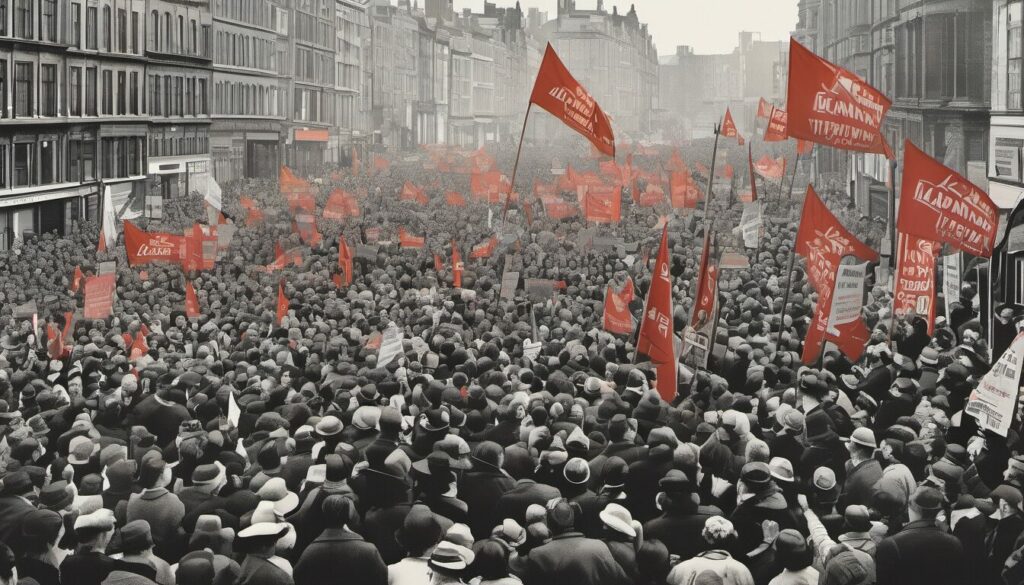Every May 1st, people all over the world celebrate Labour Day, also called International Workers’ Day. It’s not just about parades and parties; it’s a day with a deep history tied to the fights and victories of workers’ movements worldwide.
Origins of International Workers’ Day:
In the late 1800s, big changes were happening as factories spread across the world, changing how economies worked and how people lived. While some got richer with new opportunities, most workers faced tough jobs, long hours, and low pay in unsafe conditions. Out of this unfair situation, Labour Day was born.
In the United States, as factories grew and cities expanded, workers became unhappy with their tough jobs and bosses who asked too much. By the late 1800s, many wanted better pay, shorter hours, and safer workplaces. Then, on May 4, 1886, in Chicago, a big event called the Haymarket affair happened, sparking a worldwide labor movement.
That day, thousands gathered peacefully in Haymarket Square, asking for an eight-hour workday. But things turned chaotic when someone set off a bomb in the crowd, causing panic and violence between police and protesters. This event, known as the Haymarket massacre, shocked the nation and made many people anti-worker.
Despite this tragedy, the labor movement kept going, remembering those who died fighting for fair treatment. In the years that followed, May 1st became a day to honor workers and their fight for fair wages and good conditions.
In 1889, after the Haymarket affair, the International Socialist Conference met in Paris and declared May 1st as International Workers’ Day. This brought workers from all over the world together to fight for better rights and conditions, starting the global tradition of Labour Day.
Today, on Labour Day, we remember those who fought for fair treatment and keep working for equality and justice for all workers. Let’s never forget the hard work of those who came before us and keep pushing for a world where every worker is treated with respect and fairness.
The Haymarket Affair and its Global Impact:
The Haymarket affair was a big moment in labor history. It was a sad event that had a big impact worldwide and led to International Workers’ Day.
After the Haymarket tragedy on May 4, 1886, in Chicago, workers everywhere felt motivated to act. The day started with a peaceful protest but turned violent when clashes broke out between protesters and police. This event left a strong impression on the labor movement.
The news of what happened at Haymarket shocked and united workers all over the world. From New York to London, Berlin to Buenos Aires, people took to the streets to demand justice for those who died and to show they were still committed to fighting for workers’ rights.
In July 1889, a big meeting called the International Socialist Conference happened in Paris. Leaders from socialist and labor groups across Europe and North America came together to talk about the challenges workers faced and how to fight for their rights.
At this meeting, they decided to make May 1st International Workers’ Day. They picked this date to remember the struggles of workers everywhere and the sacrifices they made for their rights. This decision got strong support from millions of workers represented by the delegates.
International Workers’ Day is really important. It reminds us how powerful it is when people come together and stand up for what’s right. It’s a day to honor all the people who fought for workers’ rights.
For more than a hundred years, International Workers’ Day has been a day of action for labor activists and workers who want to make life better for themselves and future generations. It’s a day to protest, celebrate, and think about what we can do to make things fairer.
As we remember International Workers’ Day each year, let’s not forget what happened in the past or the challenges we still face. Let’s support workers everywhere and keep fighting for a world where everyone gets treated with dignity, respect, and fairness at work.
Spreading Across Borders:
Labour Day started in the United States because workers there faced a lot of problems. But soon, it became important worldwide as workers in other countries faced similar challenges. When people heard about what happened at Haymarket and the creation of International Workers’ Day, they felt inspired to stand up for their own rights.
In Europe, where industrialization was changing things, workers saw what was happening in the US and decided to take action too. Unions and worker groups in different European countries came together to ask for better pay, shorter workdays, and safer workplaces. They showed unity through big protests in cities like London, Paris, and Berlin, where workers from different jobs and backgrounds came together.
In Asia, Latin America, and Africa, where colonialism and unfair treatment made life hard for workers, Labour Day became a way to fight back. In places like India, China, and Egypt, where people were also fighting for independence, workers used May Day to speak out for their rights and for a fairer society. In Latin America, workers used the day to challenge unfair governments and ask for things like land reform, better work rights, and democracy.
Labour Day spreading to different countries was made easier because of how connected the world was becoming. Workers’ groups talked to each other across borders, sharing ideas and support. The International Labour Organization (ILO), created in 1919, helped with this by giving workers a place to talk about their problems and ask for changes on a global level.
Labour Day is important all over the world because it brings workers together, no matter where they’re from or what language they speak. Even though different countries might have different issues, the main idea of Labour Day—standing together for fairness, respect, and equality—stays the same.
When we think about Labour Day spreading around the world, it reminds us that the labor movement is still important today. With globalization, new technology, and uncertain economies, workers need to support each other more than ever. Labour Day shows us that when workers join forces, they can make real changes for the better and keep fighting for fairness and rights in society.
The Role of the Labor Movement:
During the 20th century, the labor movement became a strong voice for workers everywhere. Whether in big factories or farms, unions and worker groups played a big role in making sure workers got fair treatment and better conditions.
One big thing the labor movement did was negotiate deals for workers. By coming together in unions and talking with bosses, workers could get better pay, safer workplaces, and benefits like healthcare and time off. This helped workers stand up for themselves and make sure their families were secure.
The labor movement also worked to make laws to protect workers. Unions and groups pushed for rules to stop things like unfair pay, unsafe conditions, and discrimination. They fought for laws like minimum wage, safety rules, and laws against discrimination. These rules made sure workers had a fair chance at work.
But the labor movement did more than just make laws. It also pushed for bigger changes in society. Unions and groups got people together to ask for things like help for the poor, programs for people without jobs, and homes people could afford. These actions helped make things fairer for everyone.
Besides all this, the labor movement also raised awareness about workers’ rights. Through protests, strikes, and boycotts, workers and their supporters made sure people knew about unfair things happening at work. They used the media and education to show why workers’ rights were important and why everyone should care.
Even as things change in the world, the labor movement keeps going. While work looks different now than it did back then, the core ideas of the labor movement—standing together, talking with bosses, and fighting for fairness—are still super important. In a world where some people have a lot and others struggle, the labor movement is still there, speaking up for workers and fighting for a better, fairer world.
Labour Day Today:
Labour Day, celebrated every year on May 1st, is a crucial moment in the global labor movement. Around the world, it reminds us of the ongoing fight for workers’ rights and fairness, showing the shared hopes of millions working for a better world.
The way people mark Labour Day can differ a lot from place to place, depending on each country’s history and culture. Some countries have parades, protests, and gatherings where workers and their supporters come together to celebrate their wins and push for more progress. These events often have speeches, music, and performances that show how important it is for workers to stick together and take action for their rights.
In other places, Labour Day is a public holiday. It’s a chance for workers to take a break and spend time with their families and communities. It’s also a time to think about how much workers contribute to society and to remember the hard work done in factories, offices, fields, and homes. For many, it’s a day to honor the sacrifices made by earlier generations of workers who fought for better conditions, fair pay, and basic rights.
Even with different traditions, the main message of Labour Day stays the same: workers coming together for a fairer, better world. It’s a day to promise again to fight for fairness, equality, and respect for everyone. It’s a time to focus on making sure all workers are treated well and have what they need to live good lives.
Today, workers face a lot of tough challenges. With things like big changes in technology, the pandemic, and uncertain jobs, it’s not easy for everyone. But the labor movement keeps changing and finding new ways to stand up for workers. Whether it’s organizing online, demanding fair pay, or making sure workplaces are safe, workers and their supporters are still fighting for better lives.
As we mark Labour Day this year, let’s not just look back at what’s been done, but let’s also promise to keep fighting for workers’ rights and fairness. Let’s stand together with workers everywhere and keep working to make sure everyone is treated with dignity, fairness, and respect, both at work and in the world beyond.










More Stories
Alexander the Great: A Legacy Unparalleled
The Mauryan Era: India’s first great empire
Battle of Verdun: The Longest Battle of World War I